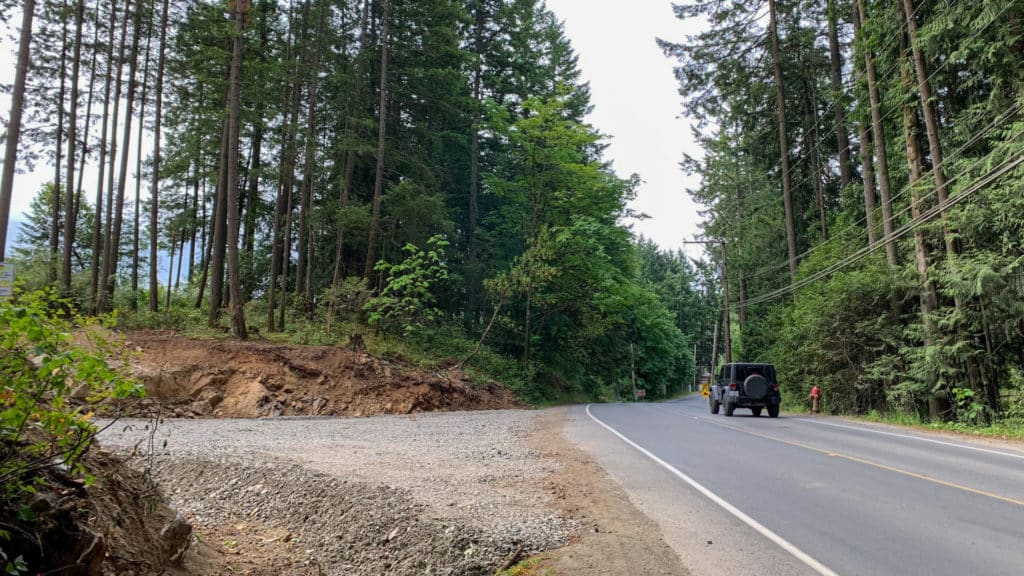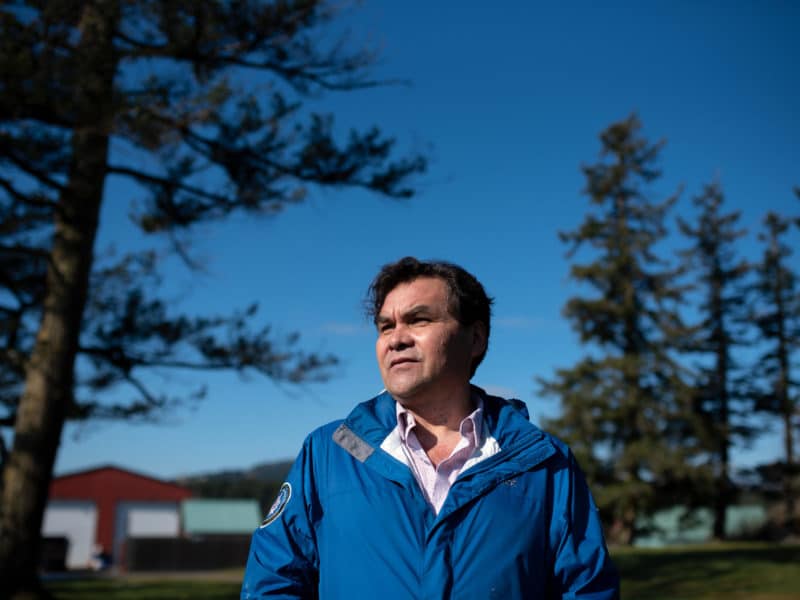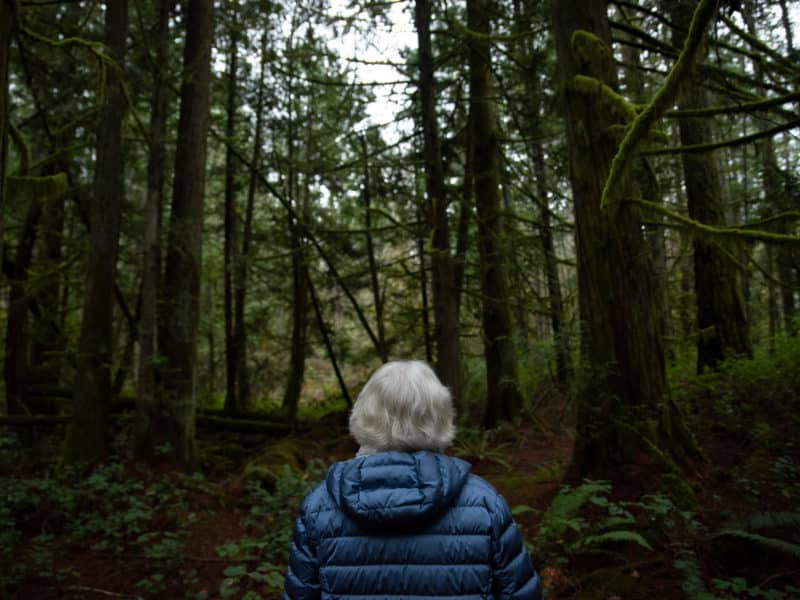
This article is the fifth part in an ongoing series about a fight over a gravel quarry in the Highlands, and its broader implications. Read the first four parts here, here, here and here. Sign up to get more stories like these in your inbox.
A recent decision from the B.C. Court of Appeal regarding a controversial quarry operation in the District of Highlands has highlighted shortcomings in the province’s mining laws, the community association that launched the fight says.
On May 5, 2021, the Highlands District Community Association appealed a lower court’s decision to deny a judicial review of the permitting process that granted O.K. Industries Ltd. permission to operate the rock quarry.. The basis of the association’s argument was that climate change, and the effects the quarry could have on climate change, were not considered in the permitting process.
But the B.C. Court of Appeal denied the judicial review again. The court affirmed that it must work within the framework of current B.C. laws, which defer to the judgement of statutory decision makers — working under the Ministry of Energy, Mines and Low Carbon Innovation and its legislation — in cases like this. The current rules do not require consideration of climate impacts, and the court therefore has no authority to compel it, the judge found.
“In my view, the heart of HDCA’s concern goes much deeper than the legal parameters of the Mines Inspector’s authority,” Justice Barbara Fisher concludes in the appeal decision. “This is a submission that seeks a legislative response to a problem of global magnitude, but provides no basis for this court to intervene.”
In an emailed news release, the Highlands District Community Association says the court’s decision highlights shortcomings in the province’s Mines Act when it comes to addressing climate change. Currently, the Environmental Assessment Act requires consideration of environmental impacts for large but not small mining projects.
The association says mining legislation in B.C. needs to change. Meanwhile a Highlands community group — #NotOK — as well as the BC Mining Law Reform Network are already making efforts to lobby for these changes. And Mel Sangha, corporate advisor for O.K. Industries, agrees that pushes for legal change is the right avenue for the groups as they continue to seek redress.
“The community association [is] trying to lobby basically for a change in legislation that would provide consideration of climate change and community input for applications of this nature,” Sangha says. “And I think that’s probably the correct venue, or the correct group of people to go after because they’re the lawmakers. … And if, if they think society needs to move in a different direction … a new law would come out and we’d live up to that new law.”
Related: Consider climate change, Highlanders argue in quarry court appeal
Background on the controversial quarry
Nestled between trees on Millstream Road is a rock quarry operation, owned and conducted by O.K. Industries Ltd. The quarry site is on the southern end of the District of Highlands — a forested refuge known as the lungs of the region — and borders the rapidly growing City of Langford. It has also become the site of protests over the last few months.
In 2020, O.K. Industries was granted a permit under the Mines Act to begin work on the rock quarry. The permit was granted by a statutory decision maker, who works under the Ministry of Energy, Mines and Low Carbon Innovation.
For years, many Highlands residents — including the District of Highlands council — have expressed their opposition to the quarry operation, citing concern for the environment, potential effects to drinking water, noise issues, impacts on climate change and more.
However, O.K. Industries argues that it continues to follow the law in developing the quarry. The company even hired a third party to complete an environmental effects and mitigation report as part of the permit application process in response to residents’ concerns — even though quarries of this size do not have to undergo an environmental assessment under provincial law.

The statutory decision maker took the environmental effects and mitigation report into account when granting the quarry permit. And the permit includes stipulations about the management of groundwater, surface water, ecology and wildlife, dust and noise. But in his report, the decision maker says “climate change is not relevant under the Mines Act.”
Related: The Highlanders: A community unites against urban incursion
Reaction to the appeal decision
Sangha says the initial thought at O.K. Industries in response to the appeal decision was that the company has gotten through another court case and that it’s finally over. He says the company’s intent is to live up to the terms and conditions of the permit that was granted to them.
“As a society, we’ve agreed amongst ourselves to cooperate within a certain framework, and that framework is called the law,” Sangha says. “And so we’ve agreed to operate within the law.”
He says despite community opposition, the location of the rock quarry is beneficial to the business and consumers given its proximity to the O.K. Industries facility to process aggregate in downtown Victoria. Other options for a rock quarry would have taken the company to farther places like the Malahat, meaning trucks would have to travel longer distances and emit more carbon by doing so. The cost of operations would also increase, making O.K. Industries customers — which include municipalities and the Victoria International Airport — pay more for pavement. Switching to greener vehicles to transport aggregate would also increase costs, he says.
But the Highlands District Community Association chair Scott Richardson says that just because it’s the law, doesn’t mean operating within the status quo is right.
“In the face of the greatest existential threat to the future of our species, OKI carries on in its business-as-usual style, over the objections of an entire community, destroying a vibrant, intact, carbon-sequestering ecosystem, all for the sake of profit,” Richardson says in a news release. “This is the tragedy of the commons — as each resource extraction enterprise seeks to grab its share without any regard for global climate change, each is incrementally destroying our commons and our hope for a healthy planet.”
In an interview with The Discourse, Richardson says he believes the District of Highlands is heading down a new path of conducting business — one that takes issues like climate change into account even when current laws may not have caught up just yet. He says the district is operating under a paradigm that considers science and considers the threat of a climate emergency when making decisions and argues that businesses and governments should start to do so as well.
That’s why he says he was happy to see Justice Fisher’s statements in the B.C. Court of Appeal Decision, despite the community association’s appeal being denied. The decision identifies limitations in the province’s mining laws when it comes to addressing climate change, giving advocacy groups like the BC Mining Law Reform Network another reason to push for changes to the province’s mining laws, Richardson says.
And Ian Knapp, the lawyer who represented the Highlands District Community Association in court, agrees.
“In this case, one of the most pressing environmental challenges of our time — climate change — was expressly overlooked in this balancing exercise and the courts have, to date, held that the law does not demand such consideration,” Knapp says in a news release. “It is apparent that this deficiency in the law should be corrected by either the legislature or a higher court.”
Taking the onus off communities
The B.C. Court of Appeal decision also suggests the onus would have been on the Highlands District Community Association or other community members to present the statutory decision maker with scientific evidence about potential climate change impacts the quarry could have, if they wanted that to be considered.
But Richardson says placing that onus on individuals is unfair.
“We hear through the decision that if we really wanted [climate change to be considered], we were obligated to go out and do studies and hire experts … when we have no funding for any of that and when the process gives intervenors no funding,” Richardson says. “Really what it’s saying is that it’s small communities like ours that are carrying the weight of the climate change fight and that’s not right either.”
The fight to give communities more agency and more consideration when it comes to mining operations and decisions is something that groups across the province — part of the BC Mining Law Reform Network — have taken on. And it’s something that Highlands community members who are part of the #NotOK group, in opposition to the quarry, have begun work on as well, according to Karen Burns, a member of the group.
Burns previously told The Discourse that the community group is researching ways to reform mining laws in the province so that they align with community values and climate targets.
Related: Mining reform needed to prevent costly conflicts, advocates say
Another court appeal to come

A separate court appeal, filed by the District of Highlands, is fighting a Jan. 20, 2021 decision from the B.C. Supreme Court that says municipal bylaws do not apply to mining operations approved by the province. The District of Highlands first filed a court case regarding this when trying to enact its own bylaws on the O.K. Industries quarry property. The date for this appeal decision has not been set.
But the B.C. Supreme Court’s decision doesn’t only affect the District of Highlands. Black Press Media reports that other municipalities in B.C., including the City of Mission, are concerned their bylaws won’t apply to mine operations within their boundaries.
“The City of Mission has been in contact with the City of Abbotsford, as well as the Union of BC Municipalities (UBCM), looking for ways to support the District of Highlands’ case when it lands in BC Court of Appeal,” the Black Press Media report says. [end]
This Delving Into Development article is made possible in part with funding from the Real Estate Foundation of BC and Journalists for Human Rights. Their support does not imply endorsement of or influence over the content produced.



